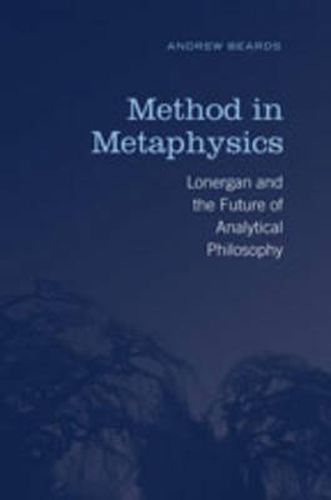Readings Newsletter
Become a Readings Member to make your shopping experience even easier.
Sign in or sign up for free!
You’re not far away from qualifying for FREE standard shipping within Australia
You’ve qualified for FREE standard shipping within Australia
The cart is loading…






In the last few decades, analytical philosophers have rediscovered an interest in the subject of metaphysics. Surveying the contributions made by these philosophers, Method in Metaphysics initiates a critical dialogue between analytical metaphysics and the philosophy of Bernard Lonergan. It argues for a basic method in metaphysics, a method that arises from a critically grounded epistemology and cognitional theory. In addition, it serves as a much-needed overview and introduction to current trends in analytical metaphysics.
Andrew Beards shows how Lonergan’s philosophy can help to clarify not only particular issues in current debates but also the larger question of a basic method. He goes on to apply this method to topics at the forefront of discussions in contemporary philosophy - topics such as universals, tropes, events, causality, and the metaphysics of the self and the social. While the main focus of the study is on Lonergan and analytical philosophy, Beards also introduces the philosophies of Whitehead, Husserl, and Derrida into the debate. He brings Lonergan’s critical realist philosophy into finely textured dialogue with a number of well-known contemporary metaphysicians such as Dummet, Putnam, Lewis, and Kripke.
$9.00 standard shipping within Australia
FREE standard shipping within Australia for orders over $100.00
Express & International shipping calculated at checkout
In the last few decades, analytical philosophers have rediscovered an interest in the subject of metaphysics. Surveying the contributions made by these philosophers, Method in Metaphysics initiates a critical dialogue between analytical metaphysics and the philosophy of Bernard Lonergan. It argues for a basic method in metaphysics, a method that arises from a critically grounded epistemology and cognitional theory. In addition, it serves as a much-needed overview and introduction to current trends in analytical metaphysics.
Andrew Beards shows how Lonergan’s philosophy can help to clarify not only particular issues in current debates but also the larger question of a basic method. He goes on to apply this method to topics at the forefront of discussions in contemporary philosophy - topics such as universals, tropes, events, causality, and the metaphysics of the self and the social. While the main focus of the study is on Lonergan and analytical philosophy, Beards also introduces the philosophies of Whitehead, Husserl, and Derrida into the debate. He brings Lonergan’s critical realist philosophy into finely textured dialogue with a number of well-known contemporary metaphysicians such as Dummet, Putnam, Lewis, and Kripke.